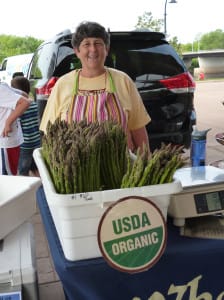by Mark Kastel
Big Food/USDA Collusion Undermines the Seal, but the Fight Continues
 |
| Cornucopia board president Helen Kees and her family operate Wheatfield Hill Organics, a fifth- generation, diversified farm in west-central Wisconsin. She was one of the state’s first certified organic beef producers. |
We are getting more correspondence from our farmer-members, and consumers, asking whether it’s time to give up the fight to save the integrity of the organic label from corporate plunderers and their all-too-accommodating federal regulators. Many suggest that it’s time to create an alternative label and/or an alternative certification system.
My standard reply to this suggestion is: “Too many good people have worked too hard, for too many years, to grow organics into a marketplace force with real economic value (now $40 billion/year) to hand over the label to a pack of corporadoes out to make a quick buck.”
Although many people around the country have access to local food that is produced under organic management, most citizens still need a reliable retail alternative to the dominant, toxic agricultural paradigm that is conventional food.
We thought that the USDA organic seal would equate to a Cliff Notes version of ethical food research. Sadly, it’s just not good enough anymore. The USDA has sat back and greased the skids for corporate agribusiness to redefine what organic farming means.
That’s why Cornucopia has created several in-depth reports and associated scorecards rating the ethical approach brands take to creating organic dairy products, eggs, soy foods, breakfast cereal, yogurt, and more. In a few weeks we will release a major update to our Scrambled Eggs report and scorecard.
We are also in the process of creating similar resources investigating meat chickens and organic beef. These reports will distinguish between the brands that depend on family farmers, whose animals are respected and live rich lives, and those that source from factory farms and imports.
The scorecards should not be necessary. You and I are already paying taxes for the USDA to assure, as charged by Congress, that it will protect the organic marketplace for ethical farmers, and the processors they partner with, and the authenticity of organic food for consumers. It shouldn’t take the tireless work of a public charity, The Cornucopia Institute, and the thousands of members who financially support the organization, to get the job done.
But that’s not the case today. The USDA needs to step up and do their job!
If we succeed in our efforts to turn around the USDA, the scorecards will change. Instead of a 1-5 scale, there will only be the top two tiers: certified organic, complying with the minimum requirements of the law, and the heroes in this industry that are going “beyond organic.”
In the meantime, we have been asked to create an alternative certification, or certification on top of the USDA credentials. But if we did so, Cornucopia would run into the same inherent conflict of interest that current certifiers have. The farms and processors pay the certifiers for their blessing—and the larger the factory farm or business, the bigger the payday for the certifier.
Today organics has become a bifurcated industry. On one side you’ve got certified organic farmers who attend farmers markets, run CSAs, and sell directly to co-ops and other local stores. They are joined by a handful of ethical companies, some of them very large, like Nature’s Path, North America’s largest organic cereal manufacturer; Eden Foods, a diversified organic food company; Nutiva, maker of organic “superfoods”; and Dr. Bronner’s (don’t drink their soap, but it is made with certified organic oil).
These large companies, still controlled by the founding families, are truly walking their talk, proving that you can sell 100 million dollars’ worth of products and not betray your values.
On the other end of the spectrum are large agribusinesses that primarily sell conventional food, that have invested in organic brands (see Dr. Phil Howard’s Who Owns Organic infographic). They are either betraying organic consumer goodwill, sourcing from giant factory farms or dubious imports from China and elsewhere, or they are operating in secrecy, with the blessing of the USDA, and we just don’t know the true pedigree of their food.
The organic farmers who comply with the spirit and the letter of the law, and their high-integrity certifiers, are doing so because they are honest and ethical—not because there’s a high likelihood of the USDA sniffing out improprieties. The majority of organic farmers, the smaller family-scale operations, really do believe in the mission.
Who owns the organic label anyway? We all do. Large and small farmers, large and small businesses, and especially customers, who are willing to pay a premium for food produced to a different ethical standard.
In this world of massive corporate corruption, where government regulators have been “bought and sold” (think FDA oversight of Big Pharma or USDA assurance of GMO safety), why should organics be any different? Because we said so!
Congress enacted a damn good law in the Organic Foods Production Act of 1990. It set up the National Organic Standards Board (NOSB) as a multi-stakeholder independent body to advise the Secretary of Agriculture and create a buffer between corporate lobbyists and the regulators. That law has been grossly disrespected and violated under Democratic and Republican administrations, but it has never been more undermined than it is right now.
So, stay tuned. If we need to shift gears, you will be the first to know. In the meantime, we are going to continue to fight like hell, in Washington, in the federal courts, and in the court of public opinion, to save the organic label. After 30 years of a loving farmer/consumer partnership in building this viable marketplace alternative, it’s worth the effort.

